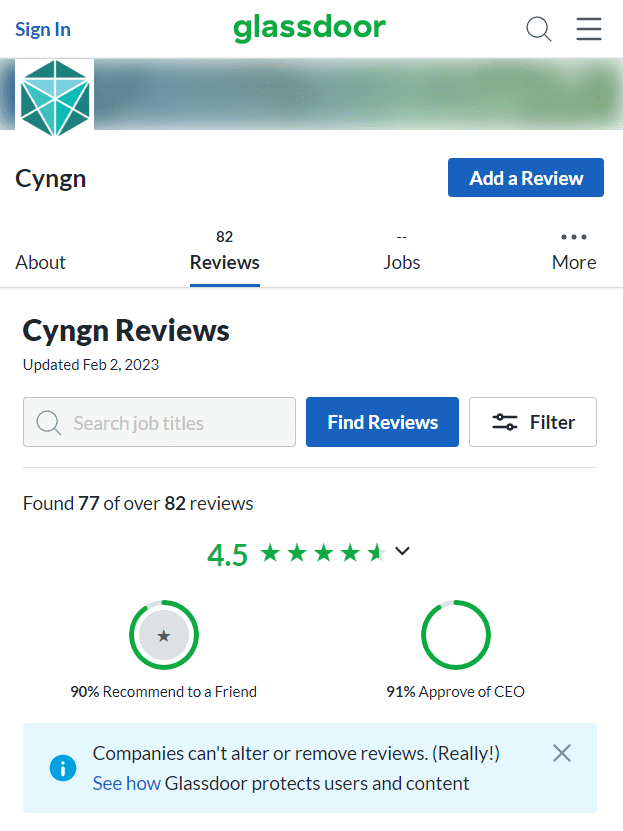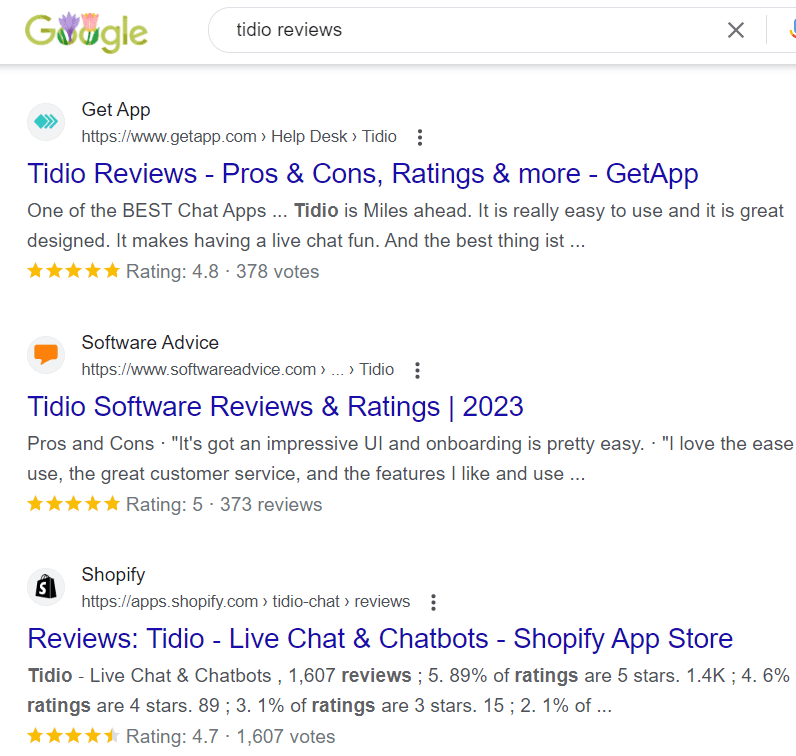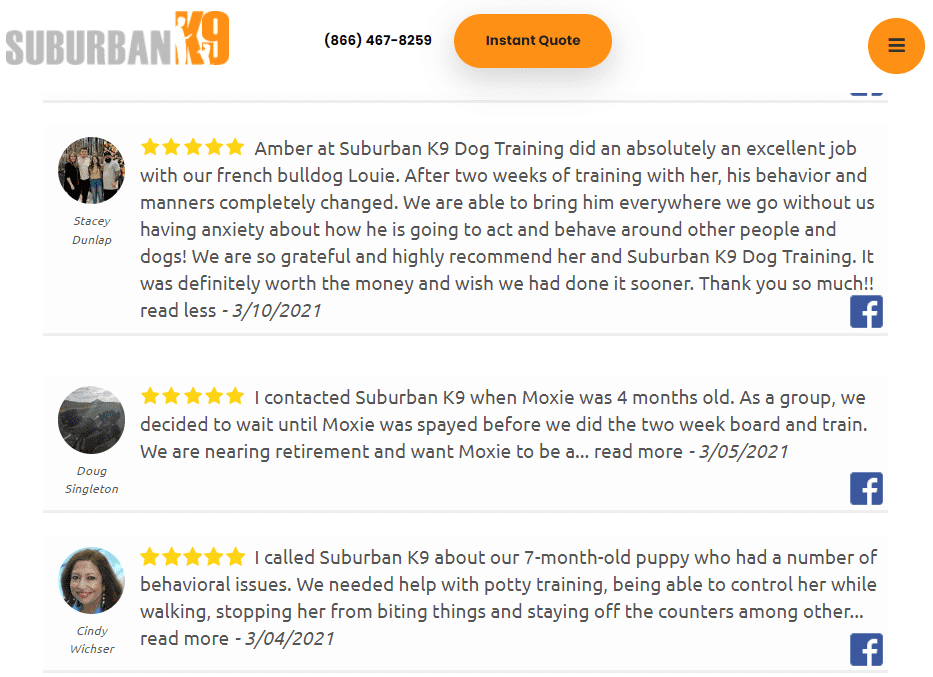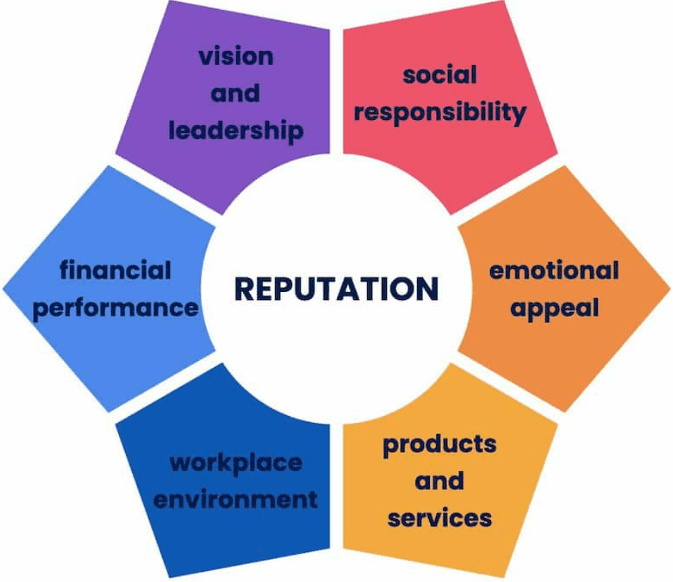Learn why building a reputation is critical for business success in our insightful guest post from Novum™ below.
As a digital marketer or business owner, building a reputation is as challenging as generating sales and conversions. As more online buyers rely on online reviews, word-of-mouth marketing, and user-generated content to make their purchasing decisions, businesses are investing more in their online presence and customer experience.
A recent survey by a leading reputation management firm revealed that 3 out of every 4 customers trust a brand with positive online reviews. A positive online presence is not only vital for attracting new customers but equally crucial for appealing to top talent and skilled employees.
In this article, we’ll discuss how having a strong reputation can improve customer loyalty, boost business sales, and generate a greater market share for businesses. Towards the end of this article, you’ll learn how businesses with a solid reputation are growing in the competitive market with real-life business examples. You’ll also learn the right marketing strategies to adopt in 2023 to build a better business reputation.
Let’s get started.
7 Key Reasons Why Establishing a Reputation is Mission-Critical for Your Business
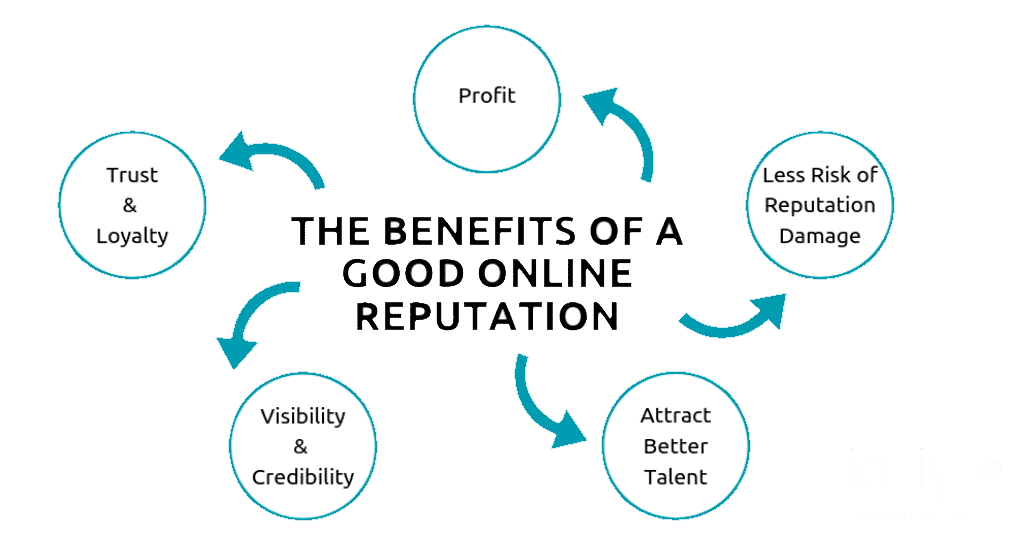
Building a brand reputation is crucial for businesses to survive and thrive in the competitive market. We’ve covered the 7 reasons that’ll convince you how building a reputation is crucial for your business growth.
1. Increased Brand Trust
Brand reputation matters the most when it comes to building customer trust and affinity. Since 90% of customers visit review websites before going to a brand, having a positive brand reputation is a must for a business to survive in the market.
It’s important to note a brand’s online presence if the first interaction a potential client may have with a business. Keeping that in mind, your online presence will determine whether the visitors take any purchasing decisions on your website or physical store or not. If a prospect finds positive stories and online reviews on your business, he’s more likely to make a purchase.
Similarly, if your potential leads search your brand online and find negative stories and reviews on it, they’ll most likely avoid making a purchase. Hence, it’s important to get your customers to leave reviews on your products or services to serve as a roadmap for potential customers in making purchases.
An even more crucial step for building a reputation online is tackling negative experiences effectively. Take the example of how Speechify’s customer support has tackled the negative review on Play Store. See how they’ve started their response by acknowledging the issue and apologizing for it. Second, they’ve shown interest in the customer’s query by offering help and encouraging him to share more details about the issue.
These types of thoughtful responses to negative business reviews help prospects build trust in the brand. As prospects are assured the brand takes full responsibility for its service and customer satisfaction.
Image Source
2. Better Employees
It’s natural to attract a pool of talented employees to a company or business that holds a strong reputation in the market. Interestingly, 50% of the employees are not likely to work for a brand with a poor reputation. We all want the best for ourselves. Moreover, people like to work for companies that have a strong financial and ethical image.
In today’s time, people can search for a business and get an idea of their mission, ethics, and company culture via their online presence. Hence, It’s equally important for businesses to invest in their online presence to attract the best talent.
Here are the following hiring benefits that come with a better brand reputation:
- Broader talent pool
- More job applications
- Higher employee retention
- Higher chances to get to the top talent
- Talent having a professional reputation
If you’re deciding whether to accept a job offer at a company, you might look for the following information on Google, Glassdoor, Linkedin, and other social media channels specifically designed for corporate businesses:
- Brand value
- Brand presence
- Media coverage
- Financial performance
- Employee/staff reviews
- User-generated content
- Company Google reviews
- Corporate social responsibility
One of our favorite examples is Cyngn, an autonomous vehicle solutions company whose brand value, salary expectation, company culture, and employee satisfaction can be reviewed through Glassdoor.
3. Higher Brand Authority
Building a reputation as a brand helps you establish authority in your niche. People start viewing your business or website as a leading authority and expert in your field. You can do this by creating useful content and offering services that are beneficial to the customers, and community.
One of our favorite examples is TrustShoring which seeks at building authority in the software development industry by exhibiting its success stories. Their website has a separate section of “case Studies” where they share the top brands that they’ve partnered with and helped reach their best potential and scaled their business.
Moreover, the same brand offers valuable knowledge to its website visitors, customers, and the general public through its blog posts, playbooks, and podcasts. Such incentives not only help attract more customers but also help build brand authority. When a brand shows they have expertise in a particular field, people tend to see it as trustworthy and credible and might end up making a purchase.
Take another example of Career SideKick which is primarily a resume-building website that’s working towards building a reputation by offering free interview advice and preparation tips to freshers who are ready to secure their dream jobs.
The individuals looking out for a job find this website useful and relevant as it helps them prepare for their job interview. This ultimately sets the website as an authority in the field of career development and guidance.
4. Increased Website Traffic
A better brand reputation is closely linked to higher website traffic and more leads. Any business or website that has incorporated reputation management into their business strategy works on the following key areas.
4.1 Blogs
Websites include a separate blog section to their website to attract more leads and conversions. This works by building authority in your field by posting useful, relevant, and informative content to your blog. This approach helps in gathering more website traffic which ultimately leads to more sales and revenue.
4.2 PR
Public relations or PR involves various activities that a business adopts to build beneficial relationships between the public and the business. Marketing, communications, and advertising are the pillars of PR management. Effective PR strategies help in getting more traffic to your website.
For example, organizing special events inviting all stakeholders, the public, social media influencers, and media for a new product launch works as an excellent PR strategy to build a brand reputation.
4.3 User Reviews
Positive user reviews of your business help in building trust and credibility. People tend to believe in user-generated content and word-of-mouth marketing more. Similarly, client testimonials work as strong recommendations for prospects.
Let’s say you’re looking for detailed brand reviews on Tidio, an AI chatbot tool, you can simply write “Tidio reviews” on Google search. The SERP results will show all user-generated reviews from tech review sites as well as social media channels to help you decide on better AI chatbot tools alongside the rating ranging from 1 star to 5 stars.
4.4 Social Media Management
Social media is a great tool to build credibility in your industry. Currently, social media channels like Facebook, Instagram, and Linkedin are actively used to bring website traffic through personalized content marketing. Moreover, marketers are more focused on increasing video engagements as millennials and gen Z are more attracted to video marketing content.
Expert Advice:
You can increase your brand reputation by incorporating modern trends into your SEO marketing strategy. Here’s a detailed SEO certifications guide to help you select the best SEO courses for your marketing needs.
5. Attract Customers
An easy way to attract customers is by building a strong online presence for your business. As online customers are increasing more than ever, they rely on online resources to check for a brand’s credibility.
For example, if your brand has a website and online blog as well as a social media presence on Youtube, Facebook, or Instagram, there are better chances that you’ll attract potential customers across multiple digital channels. The more people get to know your business, the more popular it’ll become, and the chances for leads and conversions increase accordingly.
Furthermore, when customers perceive you as an active brand who’s participating in social activities, launches insightful and ethical marketing campaigns, and participates in green marketing practices, they tend to build trust and reliability in your brand.
Similarly, online reviews are crucial to help customers decide whether they should purchase from your brand or not. One of our favorite examples is the reputation-building tactic adopted by this dog training website which features its client reviews on its homepage to help build client trust and business credibility.
6. Higher Profits
A good reputation helps brands attract and retain a continuous flow of customers to the business. This in turn ensures stable business revenues and profits. Moreover, this gives businesses a chance to scale up their business and more customer demand.
These stats are especially significant for small businesses that are struggling to get customer attention. Moreover, it’s why startups are keen on getting customer reviews and ratings.
Some businesses also give discounts, coupons, and vouchers to customers if they give honest reviews on Google reviews, Play Store, App Store, or social media channels. These reviews, in turn, act as free promotion of brands to generate leads and conversions.
7. Government Support
Businesses that align with industry guidelines, rules, and regulations are considered more reliable and credible. The government supports businesses that are positively impacting the community and environment. For example, the US EPA provides subsidies in the form of financial support to businesses that are putting efforts to reduce environmental pollution.
Some examples of subsidies include:
- Grants
- Low-interest loans
- Favorable tax treatment
- Procurement mandates
Similarly, companies that are eco-friendly or focus on community service receive a fair share of free media coverage for bringing positive change to the community. This, in turn, increases a brand reputation and helps businesses attract organic customers.
What Factors Affect A Company’s Reputation?
Consider crucial factors to build a positive reputation for your business. From working on customer service to building a better financial position in the market, there’s something for any business leader to adopt into his reputation management plan.
A. Quality Of Products And Services
As a business owner or market, ask yourself if your products and services are solving the problems of your target audience and catering to their pain points. If yes, you’re on the right track. However, with the changing trends, you ought to keep upgrading your products to meet the market standards and automate processes for your audience to give the the convenience your competitors can’t.
When customers like your products, it appears in user reviews, social media posts, news, and word-of-mouth marketing. On the contrary, dissatisfied customers tend to leave low ratings and bad reviews that can negatively impact your brand image.
B. Customer Service Experience
A brand reputation is directly linked to the quality of its customer service. Before we dive into this factor, let’s understand the customer service vs customer support debate. While customer service focuses on providing help to customers to choose products and services while customer support tends to give technical assistance to customers regarding any issues they’re facing with products or services.
For example, if a business actively responds and caters to client requests and queries on time, customers feel valued, and respected. Modern brands incorporate advanced customer service tools like AI chatbots and WhatsApp marketing software that offer automated customer service on a 24/7 basis.
C. Customer Data Protection
Online customers tend to trust businesses that don’t sell their personal data to third-party apps or agencies. The issue of cybersecurity in small businesses is more prevalent and has drastic effects. To help build a trustworthy relationship with your customers, businesses offer options to customers whether they want to accept or decline website cookies.
This approach keeps customers satisfied with any potential threats and misuse, leading to increased customer loyalty.
D. Ethical Practices
Make sure that your products are cruelty-free, eco-friendly, and don’t pose any direct or indirect harm to humans, animals, or the ecosystem. A company’s reputation is also judged by non-discriminatory employment practices and company culture. If a company is seen to value its staff, customers tend to buy more from it.
E. Quality Of Employees
If a business is well-known to carry a team of top talent and experts, its reputation automatically experiences a boost. It’s important to hire the best talent as it directly impacts the quality of a brand’s products and services. On the contrary, a company that focuses on saving employment costs by hiring beginner-level or mediocre staff may suffer in the long run because of unprofessionalism and a lack of deeper insight into technical issues.
Similarly, employee satisfaction with a firm also determines a positive brand reputation. Customers tend to trust companies that offer a work-life balance while ensuring the employees’ safety, security, work efficiency, and career progression.
F. Financial Position
The financial position of your business also impacts the brand’s reputation. If a company is making constant progress and making efforts in upgrading its products and services, customers perceive it as competitive and progressive. This ultimately improves the brand’s reputation as people tend to buy from a brand that is innovative, modern, and efficient.
On the contrary, a business that is not financially stable makes it difficult for the customers to put their trust in and make purchases.
G. CEO’s Reputation
The personal reputation of a company’s CEO determines the overall success of a business. If the business owner is ethical, trustworthy, and progressive, the company will positively benefit from his reputation. A popular example is the significant drop in the stock of Tesla after the CEO, Elon Musk was seen smoking cannabis during a live podcast.
Conclusion
While businesses are continuously experiencing a digital shift, building a reputation for your business is more important than ever. Having a positive business reputation is linked to increased customer attraction, and affinity as well as more sales and revenue. Moreover, businesses with strong reputations also benefit from free marketing, government support, and media coverage.
Now that you’ve read through the end of this article, you are better aware of the importance of building a reputation for a business to get started. You can also pick up reputation-building ideas from the real-life examples used in this article.
Are you looking to build a better brand reputation? Look no further than Netreputation.com, we’ll take care of reputation management, reputation crisis, content management, and all things reputation for your business to help you grow and scale up 3x faster.
Author Bio
Burkhard Berger is the founder of Novum™. He helps innovative B2B companies implement revenue-driven SEO strategies to scale their organic traffic to 1,000,000+ visitors per month. Curious about what your true traffic potential is?
Contact NetReputation Today
NetReputation is an award-winning leader in online reputation management. We have helped thousands of people establish, build, or repair their reputations in the digital environment. We have helped thousands of individuals and business owners take charge of the digital narrative, building trust and brand awareness in the process.
Learn more about our full selection of reputation management services, including cutting-edge review management solutions, by speaking with our online reputation management professionals today.
Call NetReputation at 844-461-3632 or complete the online form below for a free consultation.

